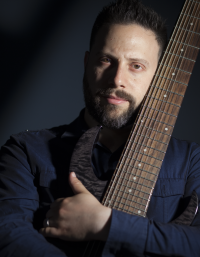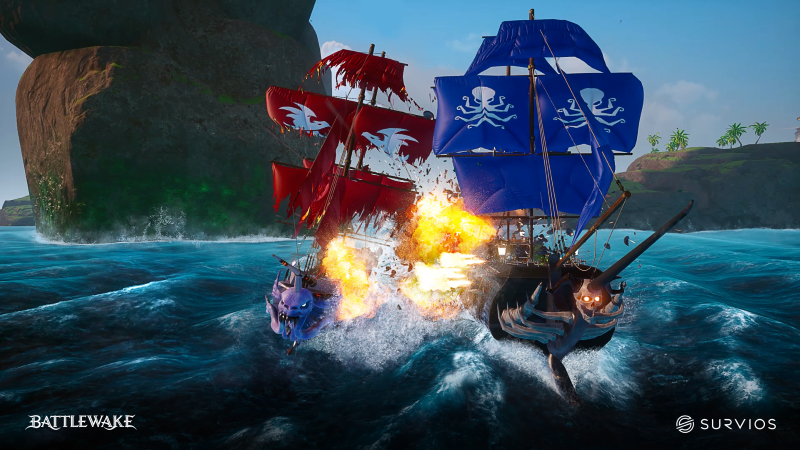Last month Survios (the studio behind Raw Data and Creed: Rise to Glory) released the naval combat VR game, Battlewake on PlayStation VR, SteamVR, Oculus Home and Viveport. Since the early summer announcement fans have been anticipating the title, and after reading a lot of the reviews Survios did not disappoint. Battlewake turns players into “super-powered pirate lords embarking on a larger-than-life nautical war for the ages”. Players control an upgradeable warship armed with a collection of thirteen different ship-based weapons inspired by real and imagined naval battles including flak cannons, ballistae, and axe throwers. Each of the four playable pirate lords also has their own ancient magic to drawn from to unleash special and ultimate attacks like tsunamis, maelstroms, and kraken. The game’s score by composer Jeremy Nathan Tisser is also worth mentioning, as it does a great job of heightening the player’s high seas experience. In the below exclusive interview, Nathan discusses his process for scoring the game.
 A lot of reviewers are saying the multiplayer version of Battlewake is where the game really shines. How does the score change when there are multiple players?
A lot of reviewers are saying the multiplayer version of Battlewake is where the game really shines. How does the score change when there are multiple players?
I would say the biggest difference between multiplayer and story mode is interactivity. When you’re playing in story mode, you want the story to grow and evolve with the player. Whereas in a multiplayer setting, you’re basically just battling it out with a bunch of different people, so the music doesn’t need to shift or evolve quite as much.
What was your inspiration for the Battlewake score?
I pulled inspiration from a myriad of different musical stylings and culture. Primarily, however, I drew on my backgrounds in heavy metal as well as traditional orchestration. We wanted a big “larger than life” style orchestral score, like you’d get in a pirate film, but we wanted it to be exciting and unique. We decided that a heavy metal twist on an orchestral pirate score was the right vibe for the game. We also looked at different cultures from around the world, and how they interpret music, be it through instrumentation, through rhythm, etc. So we used a wide variety of ethnic percussion instruments, including the African talking drum, Japanese taikos, Djun Djun, congas, various shakers, and much more. We also hired an anthropologist, with whom I also study Kung Fu, to act as a cultural consultant. We wanted to add an element that portrays some of the Voodoo cultures of Haiti. As it turns out, there’s almost no written information on the Voodoo and Vodou cultures, because to have any information in the hands of those wishing to cause harm to others could in fact be catastrophic to not just the intended target, but to innocent bystanders as well. So we found a couple of war chants that would be used for the purpose of intimidation instead, and incorporated those in the form of chants over the orchestra. Take a listen to the track “Jade and Steel” on the soundtrack when it comes out later this month!
Were there any obstacles you had to overcome, musically, while working on this game?
The biggest challenge of this game came down to how early I was brought in. I began writing music for Battlewake in December of 2017, when all that was available to me was a basic demo of the gameplay mechanics, a well-developed backstory, and a series of concept art for the various environments. Nothing was set in stone yet, and the storyline of the game itself was unknown. I had some ideas in my head, but it really took me about 8 more months to nail it down. The game itself had also grown and evolved, and was constantly changing form throughout that time, and that kept changing how the music would function within the game.
Is there a type of game you haven’t scored yet that you would like to?
I would honestly love to score a Star Trek game or a Doctor Who game. Or perhaps even a World War 2 style game. Something where I can get a little more nostalgic, and maybe write something beautiful, yet still maintain some sort of edginess to it. Personally, I just love the idea of storytelling, and I try to make that come through in my music for games as well, as opposed to just writing basic loops or standard “epic” music.
There are four Pirate Lords in the game. Which was your favorite one to score?
With Battlewake, I actually ended up scoring the 4 different environment types rather than the characters. The reason for this goes back to how early I was brought in. The story wasn’t set in stone just yet, but they still needed music. If you have a chance to play it, you’ll see how integral the music is to the “fun” experience of it. That being said, I absolutely loved scoring the arctic environments and the volcanic environments. I’ve been dying to write a big ol’ heavy metal polyrhythm into one of my scores, and Battlewake allowed the opportunity for me! The arctic level was more of my opportunity to write something that sort of follows a “song form”, so it feels like a track that could really be performed in a major concert environment. But it’s also just super fun to listen to and blow things up to!
Do you have a favorite sequence in Battlewake?
Personally, I really love when you get to release the Kraken! How many times have you watched Pirates of the Caribbean and thought “man, I’d love to get to say ‘Release the Kraken!’ in a video game…”? Well, now you can! And it is SUPER satisfying.

How much music did you create for this game? Are you going to be releasing the game’s score?
I wrote around 45 minutes of music or so, but it’s all layered and stemmed and divided into loops, so it can be turned into a few hours worth of music. As for the soundtrack, Notefornote Music has is putting out the soundtrack very soon! It’ll be available on all digital platforms around early-mid October, and then a few weeks later it will be available on a limited-edition CD print! There also may or may not be one additional release, so keep an eye out on my twitter page for that (@jeremytisser).
Are you a gamer yourself? If so, what are some of your favorite games to play?
I’m actually not much of a gamer. Growing up, I wasn’t allowed to have a Playstation or any of those like my friends, so I grew up playing games like NHL 97, Tony Hawk Pro Skater, Sonic the Hedgehog, and more on Sega Genesis, Nintendo 64, and then Gamecube. Every time I’d go to a friend’s house to play Mortal Kombat on Playstation, I’d just get whooped because they were playing every day, and I couldn’t. So I never got excited about games. However, I was ALWAYS big into VR. I used to get so fascinated by those big VR machines you’d see in the arcades, or in Las Vegas. And I always loved seeing those 3D IMAX films at the museums. When I got to graduate school in 2011 at USC, I had the opportunity to work on some really cool and advanced VR projects, so that’s what really sparked my passion. All that to say… Mike Tyson Boxing, Crazy Taxi, and Tony Hawk Pro Skater rule!


